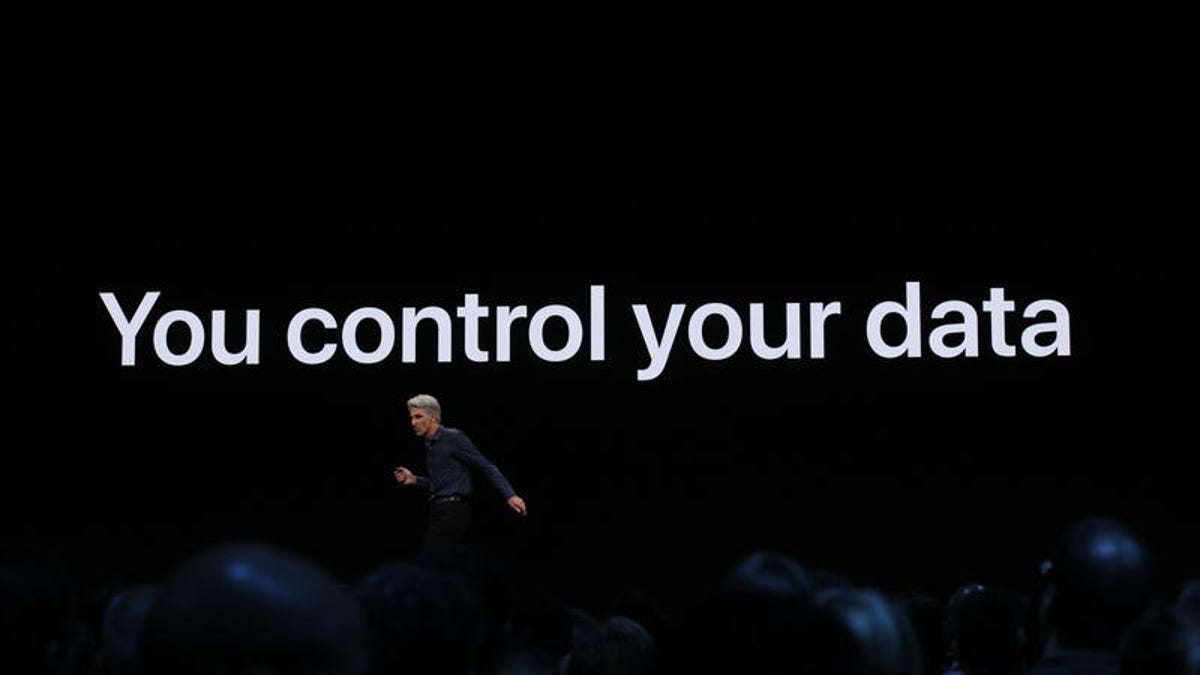Apple privacy push takes on all the creepy ways you're tracked online
At WWDC 2019, Apple announces new protections to keep your data for your eyes only.

Apple unveiled new privacy features at its developers conference on Monday.
At WWDC 2019 on Monday, Apple upped the ante on privacy again.
"We believe privacy is a fundamental human right and we engineer it into everything that we do," Craig Federighi, Apple's senior vice president of software engineering, said at the annual developer's conference.
Federighi unveiled several new features to protect people's location data, as well as announcing a new "Sign in With Apple" tool. He noted that logins from Facebook and Google are used to track people online, but with the new tool, you can use your iOS device to authenticate your login credentials.
To protect privacy from apps that ask for your email address, Apple can also now automatically generate a random email address for those services.
"This experience is meant to let you have control over your data," Federighi said.
The new iOS also puts restrictions on location tracking. Now when you give an app permission to access your location data, you can require the app to ask for permission each time. Apple now also blocks location tracking from Wi-Fi and Bluetooth.
Apple has been staking out the high ground on privacy as the public has grown increasingly suspicious about the practices of companies like Facebook and Google. Apple has been aggressive on that point, even making privacy a selling point in iPhone commercials. At the big CES show in January, it put up a large billboard on privacy above the Las Vegas Convention Center.
Also in January, Apple briefly cut off access to the iOS certificate for Facebook developers over a controversial data-collecting app from the social network.
WWDC 2019: A quick visual recap of Apple's Worldwide Developers Conference keynote
See all photosThough Google and Facebook offer free products and rely on user data for targeted advertising that generates revenue, Apple's profits come from its phones and services, with more than $120 billion coming to the company from App Store sales alone.
See also
- Apple iOS 13: New Siri voice, camera tools, Dark Mode for iPhone
- New Mac Pro makes its debut, starts at $5,999
- Apple gives the iPad its own OS
- Returning to Apple's WWDC after 20 years, now with 5 OSes instead of 1
- Get all the latest from WWDC
CEO Tim Cook has also called on lawmakers to pass federal legislation protecting people's personal data. At an Apple shareholder's meeting in March, Cook told investors that regulation is necessary.
"It's not just a marketing thing; this is who we are," Cook said.
At WWDC 2018, Apple unveiled several privacy features, such as its Safari browser blocking third-party trackers and ending browser fingerprinting. In late May of this year, Apple introduced new browser technology that blocks advertisers from being able to follow you across the internet and harvest personal details.
WWDC is where Apple details its newest software and services that'll arrive on devices later in the year. The company may be best known for its hardware, but the seamless integration of its hardware with its software is what sets Apple apart from rivals. Apple's ability to control every aspect of its products, something that began when Steve Jobs and Steve Wozniak founded the company in 1976, has been key to making Apple one of the most powerful companies in tech.
Follow all of today's Apple news.



